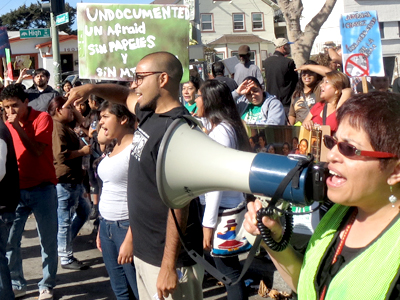
Mi Pueblo Foods at center of immigration and union conflict ---
“That’s completely false, it is an outrageous claim,” says Perla Rodriguez of the accusation that Mi Pueblo Foods requested an employee immigration audit by the U.S. Department of Homeland Security.
Rodriguez is vice president of public affairs for Mi Pueblo, a San Jose-based supermarket chain with 21 stores, 3,200 employees, and a big challenge – comply with the federal government while dealing with an aggressive worker´s union, community groups, and a fearful group of employees.
A coalition of community groups is claiming that Mi Pueblo requested the audit as a defensive move against workers and the United Food and Commercial Workers (UFCW), which wants to convert Mi Pueblo workers to union workers.
“There is no reason for a company to have the federal government do that - there are too many risks involved,” says Rodriguez.
According to ICE (Immigration and Customs Enforcement), the agency does not target stores or companies, but only investigates when it receives a tip or complaint from the public -- or another agency.
“ICE hears complaints, sometimes it is from anti-immigrant people,” says Rodriguez.
Immigrant groups reacted strongly when Mi Pueblo announced that it began to implement the federal program known as E-Verify, which checks all prospective employees’ work eligibility status. Mi Pueblo says the company felt a lot of pressure from immigration officials to sign up for E-Verify after the immigration audit began.
“ICE officials suggested that we use E-verify and not using it can have very negative consequences,” says Rodriguez. “People can be charged criminally and go to jail for not following ICE’s guidelines.”
Rebecca Ruiz-Lichter is with the Dignity and Resistance Coalition, a group of activist and immigrant organizations. She doesn’t believe the company´s statements about cooperating with ICE.
“Mi Pueblo is doing this in retaliation against these workers,” says Ruiz-Lichter, referring to workers who have been trying to organize as a union for a number of years. She says workers want certain benefits, such as getting paid overtime or vacation pay.
“They (Mi Pueblo) need to refuse to participate - we believe that they are choosing to work with ICE,” she states.
“We would not do that to our employees,” says Rodriguez. “We have invested so much in our employees, training them, giving them scholarships, and some who have been working for us for fifteen years.”
The contentious relationship between the union (UFCW) and Mi Pueblo during the last fifteen years is well documented. Repeated attempts by the union to organize Mi Pueblo employees have been unsuccessful, though the union´s determination seems unaffected.
“Mi Pueblo represents an important addition to their membership and revenue and so they have targeted us,” states Rodriguez. “It has happened to other businesses and it is happening to Mi Pueblo right now. It is their goal to have as many people to be part of their union and they have the right to pursue that.”
Though recognizing the union´s right to grow, Rodriguez does not approve of the union´s tactics. “The union has a very clear mission – listen to us, do what we say, or go out of business.”
The union recently launched a boycott against Mi Pueblo, asking people to not shop at their stores.
“The boycott reduces sales and impacts employees,” says Rodriguez. “They say they care about employees but are threatening our business.”
It is not known how long the boycott will continue, nor is it known how long the immigration audit of Mi Pueblo will continue before completion. When the audit is complete, government officials will present a list of employees who do not have proper documents to work in the U.S. Mi Pueblo will be asked to terminate those employees. What won´t be happening, according to Rodriguez, will be raids at the stores.
“That is one of the biggest misperceptions out there, but nobody will be coming to the store,” she states.
According to government figures, ICE has conducted 9,000 audits since President Obama took office.
“The Obama administration has deported more than twice the number of people than the two previous administrations,” says Ruiz-Lichter. “The coalition does not support Obama´s attacks on immigrant communities - it never has. Nor does it support corporations´ attacks on immigrant communities.”
Perhaps the only thing that all parties involved could agree on is that it is a difficult situation for everyone. Finding common ground seems to be an impossibility, despite wishes that some may have.
“If the community worked together, we could be working together for immigration reform,” says Rodriguez. “Then maybe there is one thing positive that can come out of this.”
Calls to UFCW for comment for this article were not returned.

